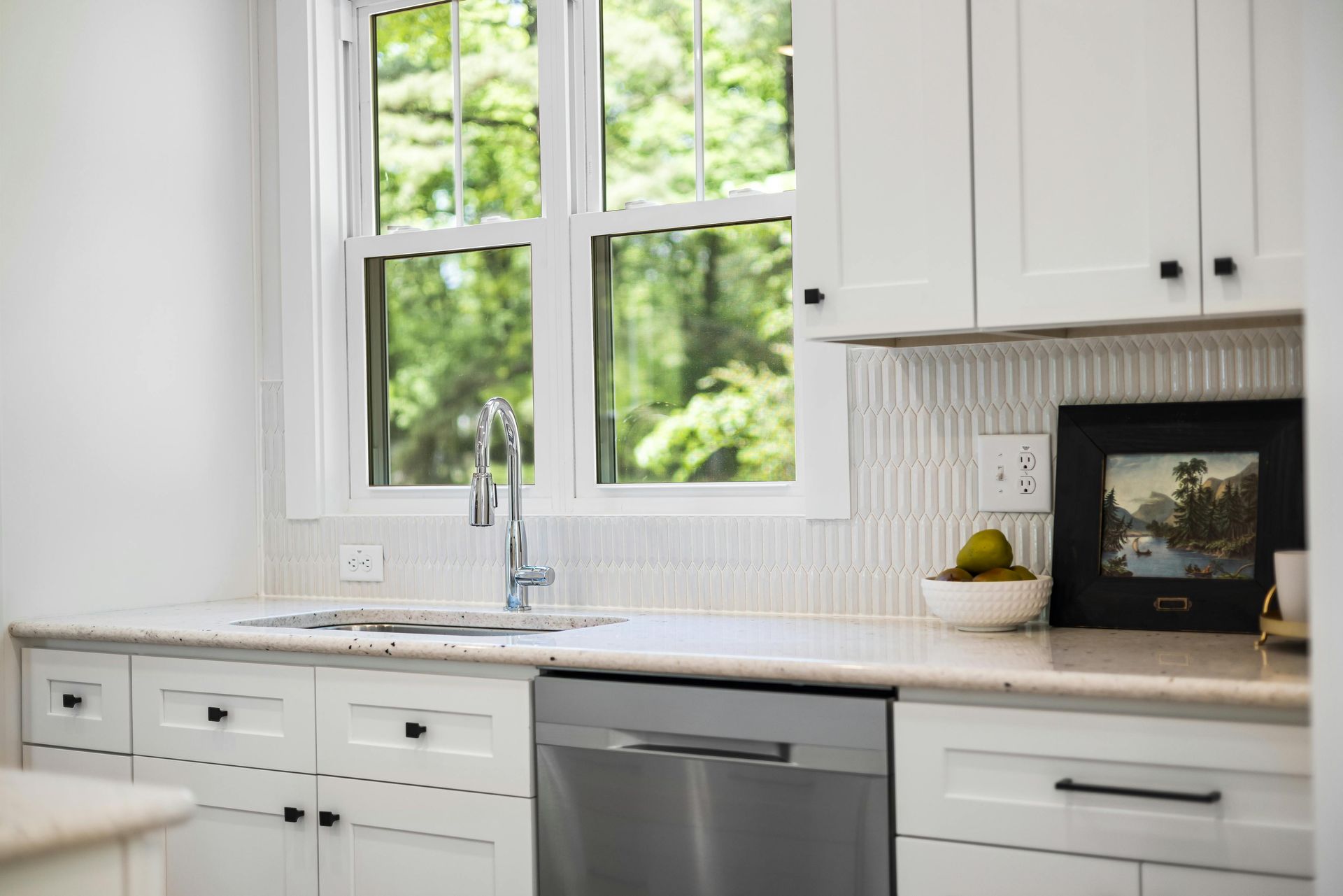
The Environmental Impact of Different Countertop Materials: What Chicago Homeowners Need to Know
October 7, 2024
In an era of increased environmental awareness, many Chicago homeowners are seeking eco-friendly options when renovating their kitchens and bathrooms. One of the most significant decisions you’ll face is choosing a countertop material, but it’s important to consider not just aesthetics and functionality, but also the environmental impact of each material. In this blog post, we’ll explore the sustainability of various countertop materials and offer guidance on how to make an eco-conscious choice for your Chicago home.
1. Granite: Natural, but with a Carbon Footprint
Granite countertops are beloved for their durability and natural beauty, but they come with some environmental concerns. While granite is a natural material, the quarrying process requires a substantial amount of energy. Large-scale extraction of granite from quarries can result in habitat destruction and the use of significant resources, such as water and fossil fuels. Additionally, granite is often sourced from distant locations, leading to increased carbon emissions from transportation.
On the plus side, granite countertops are long-lasting, meaning they won’t need to be replaced frequently, reducing the overall environmental burden over time. However, homeowners looking to minimize their carbon footprint may want to consider alternative materials.
2. Quartz: Engineered but Sustainable
Quartz countertops are a popular choice due to their durability, low maintenance, and wide variety of design options. Quartz is an engineered material made from natural quartz crystals combined with resin binders and pigments. The production process is energy-intensive and involves chemicals, but because quartz countertops are manufactured rather than mined, they avoid some of the environmental issues associated with natural stone quarrying.
Furthermore, many quartz manufacturers are adopting sustainable practices, such as recycling water during the production process and using eco-friendly resins. Quartz is also highly durable, which means it has a long lifespan and won’t need to be replaced frequently, reducing waste over time.
3. Recycled Glass: A Green Choice
For Chicago homeowners who want to make an environmentally friendly choice, recycled glass countertops are one of the greenest options available. These countertops are made by mixing crushed, recycled glass with a binding agent, typically cement or resin. The use of recycled materials significantly reduces the demand for new raw resources and diverts waste from landfills.
Recycled glass countertops are durable, non-porous, and come in a variety of colors and patterns. Additionally, they are a great conversation starter, allowing homeowners to showcase their commitment to sustainability.
4. Wood: Natural and Renewable
Wood countertops, especially butcher block, are a renewable resource, making them an environmentally friendly option if sourced responsibly. Choosing wood certified by the Forest Stewardship Council (FSC) ensures that the wood has been harvested from sustainably managed forests.
However, wood countertops require regular maintenance, including sealing and refinishing, to prevent damage. While they are biodegradable at the end of their life cycle, they may not last as long as stone or quartz, leading to more frequent replacements.
5. Concrete: Durable but Resource-Intensive
Concrete countertops have gained popularity in recent years due to their industrial-chic aesthetic and durability. While concrete is made from abundant materials like sand, water, and cement, the production of cement is highly energy-intensive and responsible for a significant amount of global CO2 emissions.
On the positive side, concrete countertops can be reinforced with recycled materials like glass or fly ash, reducing their environmental footprint. Additionally, concrete is incredibly durable and can last for decades if properly maintained, which reduces waste over time.
6. Laminate: Affordable but Less Sustainable*
Laminate countertops are often chosen for their affordability, but they are not the most environmentally friendly option. Made from layers of plastic, paper, and resins, laminate is less durable than other countertop materials, meaning it may need to be replaced more frequently. This shorter lifespan results in more waste over time.
However, some manufacturers are beginning to use recycled materials in their laminate products, so if you’re set on laminate, look for brands that prioritize sustainability.
When choosing a countertop material for your Chicago home, it's important to weigh both environmental impact and practicality. Recycled glass, responsibly sourced wood, and sustainably produced quartz offer eco-friendly options for those looking to reduce their environmental footprint. If you’re drawn to more traditional materials like granite or concrete, consider their longevity and the potential for recycled content. By making an informed decision, you can enjoy beautiful countertops while contributing to a greener planet.

November 12, 2024
Your bathroom vanity countertop plays a crucial role in defining the style and functionality of your space. In a bustling city like Chicago, where homeowners prioritize both aesthetics and durability, choosing the right countertop for your bathroom is essential. Here’s a guide to selecting a stylish and durable vanity countertop that will elevate your bathroom and stand the test of time. 1. Why Choose Durable Materials for Your Bathroom Vanity? Bathrooms are high-moisture environments, and countertops are subject to daily use. From water splashes and cosmetics to hot styling tools, a bathroom countertop needs to withstand a lot. For Chicago homeowners, durable materials like quartz, granite, and solid surface are ideal choices. These materials are resistant to scratches, stains, and water damage, making them perfect for long-lasting beauty and functionality in your bathroom. Quartz is especially popular because it’s non-porous, meaning it won’t absorb water or harbor bacteria—a key feature for bathroom hygiene. It’s also available in a wide range of colors and patterns, from subtle neutrals to bold veining that mimics marble. Granite is another resilient option, offering natural beauty and unique patterns that add character to any bathroom. 2. Consider Low-Maintenance Options for a Busy Lifestyle In a fast-paced city like Chicago, homeowners often prefer low-maintenance materials that allow them to spend more time enjoying their homes and less time on upkeep. Quartz is a top choice because it doesn’t require sealing, and a simple wipe-down with a damp cloth keeps it looking pristine. Solid surface countertops, like Corian, also provide a seamless and stain-resistant option that’s easy to clean and repair if scratched. While marble is undeniably beautiful, it’s more porous and prone to staining, making it a higher-maintenance choice. For those who love the look of marble but want something more practical, quartz with marble-inspired patterns offers the best of both worlds: the elegance of marble with the ease of quartz. 3. Optimize Your Bathroom’s Style with Unique Colors and Textures Your bathroom countertop can be a stylish focal point, enhancing the overall aesthetic of the space. Modern bathrooms often favor clean lines and subtle elegance, so choosing a neutral countertop color, such as white, gray, or beige, can provide a timeless look. However, if you’re seeking something bolder, consider a rich, dark quartz or granite countertop to add depth and sophistication. Texture is another way to add style to your vanity countertop. Polished finishes give a smooth, shiny appearance that reflects light beautifully, creating a bright and airy feel in smaller bathrooms. Matte finishes, on the other hand, have a soft, understated elegance and are more forgiving of smudges and fingerprints. 4. Maximize Functionality with Custom Vanity Countertops Custom vanity countertops can be designed to fit your bathroom perfectly, whether you have a compact city condo or a spacious suburban home. Custom options allow you to select the exact dimensions, edge profiles, and sink configurations to optimize your countertop for both style and function. For smaller bathrooms, consider a floating vanity with a slim countertop to make the space feel larger and more open. 5. Invest in Long-Term Value Upgrading your bathroom with a high-quality vanity countertop is an investment that adds value to your home. In Chicago’s competitive real estate market, a well-designed, stylish bathroom can make a strong impression on potential buyers. Quartz and granite countertops, known for their durability and appeal, offer excellent resale value and are widely regarded as premium choices. Transforming your Chicago bathroom with a stylish and durable vanity countertop is a fantastic way to enhance both beauty and function. By choosing a material that suits your lifestyle and design preferences, you can create a bathroom that feels like a luxurious retreat while holding up to daily use.

November 12, 2024
Choosing the right countertop for your Chicago condo or apartment is an exciting opportunity to elevate the style and functionality of your space. Urban dwellers have unique needs when it comes to home design: square footage is often limited, lifestyle is fast-paced, and aesthetic preferences are typically modern and chic. Here’s a guide to help you select the perfect countertop that aligns with your style and meets the demands of condo and apartment living in Chicago. 1. Consider Durability for High-Traffic Spaces In smaller spaces, the kitchen often doubles as a gathering area and workspace, which means your countertop needs to be both durable and functional. Quartz is a popular choice for Chicago homeowners due to its incredible durability and minimal maintenance. It’s non-porous, stain-resistant, and easy to clean, making it ideal for urban settings where time is a luxury. Solid surface materials, like Corian, also offer durability and can be easily customized to fit tight or oddly shaped spaces. 2. Prioritize Low Maintenance for Busy Lifestyles Living in Chicago means you’re likely juggling a busy schedule, so choosing a countertop that doesn’t require constant maintenance is key. Granite and quartz are excellent low-maintenance choices, as they only need occasional sealing (in the case of granite) or a simple wipe-down (in the case of quartz). Marble may look luxurious, but its high maintenance requirements make it less ideal for condo and apartment dwellers who may not have time for frequent upkeep. 3. Maximize Limited Space with Light Colors and Seamless Designs Many condos and apartments in Chicago have smaller kitchens, so it’s essential to choose a countertop color and style that can make the space feel larger and more open. Light-colored countertops, such as whites, creams, and light grays, reflect more light and create an airy feel, which helps maximize limited square footage. Opting for a seamless, unbroken design—without busy patterns or grout lines—can further enhance the sense of spaciousness in a compact kitchen. 4. Add Urban Style with Unique Patterns and Bold Finishes For those looking to make a statement, consider countertops with unique patterns or finishes that reflect the urban vibe of Chicago. Concrete countertops have become increasingly popular, offering an industrial look that suits the modern, minimalist style seen in many downtown apartments. Alternatively, quartz options come in a variety of colors and patterns that mimic natural stone, allowing you to achieve a luxurious look with minimal maintenance. Matte finishes are also trending and can give your kitchen an upscale, contemporary feel. 5. Think About Installation in a High-Rise Building One important factor to consider in a condo or apartment setting is the installation process. High-rise buildings can present challenges for countertop installation due to elevator access, weight restrictions, and limited maneuvering space. Materials like quartz and solid surface are generally easier to work with in tight spaces, while heavier materials like granite may require extra planning. Always consult with a countertop professional to understand what’s feasible within your building’s limitations. 6. Invest in Resale Value with Timeless Choices If you plan to sell your condo or apartment down the line, consider countertops that will appeal to future buyers. Neutral colors, durable materials, and classic styles tend to hold value well and have universal appeal. Quartz and granite, in particular, are popular with potential buyers due to their durability and elegant appearance, making them a wise investment in terms of resale value. Choosing the right countertop for your Chicago condo or apartment doesn’t have to be overwhelming. By focusing on durability, low maintenance, space optimization, and urban style, you can create a beautiful and functional kitchen that fits seamlessly with city living.
Tell us about your next project idea
JB COUNTERTOPS, LLC | Copyright 2023 | All Rights Reserved | Website created by North Shore Web Services